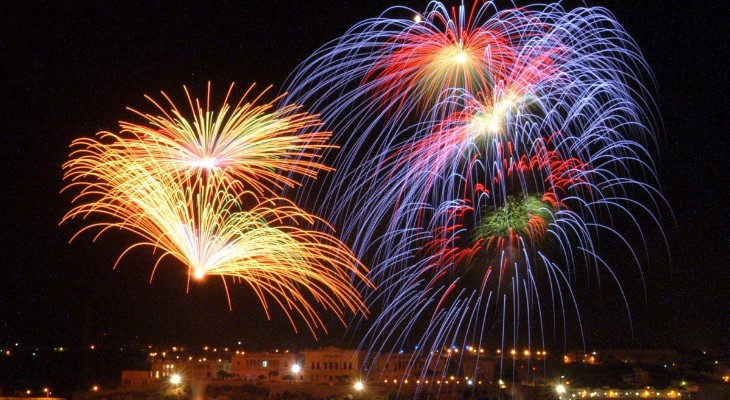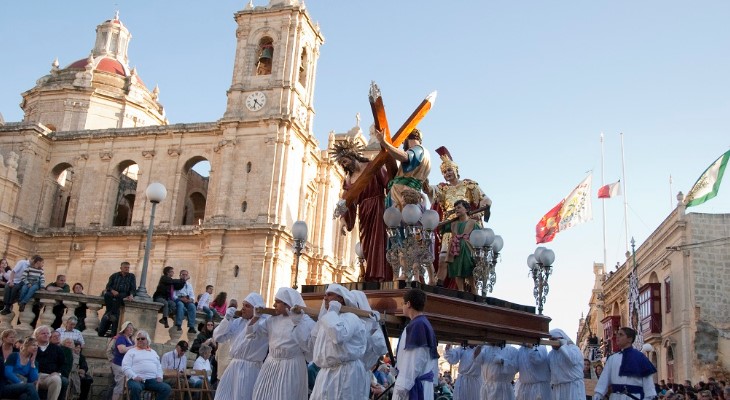Malta has no less than 14 public holidays and national holidays. Find out which, when they are and what they’re all about!

© viewingmalta.com
There are nine public holidays and five national holidays in Malta. National holidays are distinguished from public holidays for being patriotic in nature.
All banks, post offices and Government departments, as well as most businesses, close down on these holidays, so don't leave any important business for these dates! Instead, join the celebrations that take to the streets and squares of certain areas of the country. Or, like many locals, simply take the opportunity to spend time with family and friends or relax during the paid holiday. And let’s not forget the fireworks, which are pretty standard in any Maltese celebration!
Here’s a quick overview of all the public holidays and national holidays in Malta.
New Year's Day
1st January
This needs no introduction. New Year’s Day is the first day of the year and the first day of the Gregorian calendar. It is a public holiday in all countries observing the Gregorian Calendar, making it the most widely observed public holiday in the year. Huge celebrations are held in Valletta and Floriana at midnight on New Year’s Eve, including a magnificent fireworks display.
Feast of St Paul's Shipwreck
10th February
Called San Pawl Nawfragu in Maltese, this holiday is celebrated on 10th February. St Paul is the patron saint of Malta, and the feast actually commemorates St Paul’s shipwreck in Malta in 60 AD as indicated in the New Testament in the Acts of the Apostles. The feast is celebrated at the Church of St Paul's Shipwreck in Valletta, complete with a mass, procession and fireworks.
Feast of St Joseph
19th March
Saint Joseph's Day always falls on 19th March during Lent. Saint Joseph was the husband of the Virgin Mary and the foster father of Jesus. He is the patron saint of the Catholic Church, unborn children, fathers, immigrants and workers. In Malta, the feast is celebrated mainly in Mdina and Rabat with mass, colourful processions accompanied by bands, and fireworks.
Freedom Day*
31st March
Freedom Day is a national holiday that commemorates the withdrawal of the British troops from the Maltese Islands in 1979, thus freeing Malta of foreign military for the first time in ages. Called Jum il-Ħelsien in Maltese, the day is celebrated with formal activities at the Freedom Day Monument at Vittoriosa and at the War Memorial in Floriana. The real highlight of the day, however, is the competitive regatta held in the afternoon at the Grand Harbour.
Good Friday
Varies - 30th March 2018 & 19th April 2019
Holy Week commemorates the passion of Christ, his crucifixion and resurrection with larger-than-life celebrations. The feast of Our Lady of Sorrows, on the Friday preceding Good Friday, ushers in Holy Week, which includes several activities and exhibitions. They culminate on Good Friday when almost every town and village in Malta and Gozo features awe-inspiring, elaborate processions. There are lavish celebrations on Easter Sunday, the day of the Risen Christ.

© viewingmalta.com
Workers' Day
1st May
Workers’ Day celebrates the rights of workers and is celebrated in over 80 countries in the world. The date relates to the eight-hour workday that came into effect on 1st May 1886 in the US, following a request by the American Federation of Organized Trades and Labor Unions, a general strike and the Haymarket Riot. The date coincides with the religious feast of St Joseph the Worker, which is celebrated in B'Kara, while International Workers Day activities take place in Valletta.
Sette Giugno*
7th June
Is-Sette Giugno, derived from Italian, commemorates the 1919 riots that left four people dead, shot by British officials. The history relating to the riots is complex and controversial, however, the result was greater self-rule for the Maltese. The fallen rioters are thus regarded as heroes and many regard 7th June as Malta’s National Day. The day was recognised as a National Holiday in 1989 in remembrance of those who gave their lives for the rights of the Maltese.
Feast of St Peter & St Paul
29th June
The day, known as L-Imnarja in Malta, commemorates the martyrdom of St Peter and St Paul. Peter was the leader of the apostles, the first pope and also the patron saint of fishermen, and Paul is the patron saint of Malta. Both saints are highly regarded and traditional celebrations dating back to the Knights are held in the area of Rabat. Expect musical performances, dancing, festive dishes including rabbit, horseback riding and horse races. On the previous day, in Buskett Gardens, there’s food and wine aplenty and an agricultural exhibit.
Feast of the Assumption
15th August
No less than seven municipalities across Malta and Gozo celebrate the feast of the Assumption: Ghaxaq, Gudja, Attard, Mosta, Mqabba and Qrendi in Malta, and Victoria in Gozo. The fireworks competition is fierce, as is the extent to which the celebrations are conducted in each town or village; Mqabba celebrates with daily activities for three weeks! Being also the peak of summer, many local businesses shut down for one or two weeks in this period.
Feast of Our Lady of Victories*
8th September
Il-Vitorja is a very special day for the Maltese, because while it celebrates the religious feast of Our Lady of Victories, 8th September also marks a few political victories. This day marks the retreat of the Ottoman Empire forces and the end of the Great Siege of Malta in 1565. It also marks the surrender of the Italian forces in 1943, during World War II, with several Italian ships surrendering in Malta. Official ceremonies are held in Valletta in the morning, while the afternoon sees another great regatta event in the Grand Harbour. Evenings are reserved for mass honouring Holy Mary in Senglea, Naxxar, Xaghra, and Mellieha. And fireworks, obviously.
Independence Day*
21st September
Jum l-Indipendenza is always celebrated on this date in 1964, when Malta gained independence from Britain. A degree of self-rule had been granted and Independence was granted in 1964 following a close referendum that would have made Malta part of the United Kingdom. Malta became a Republic 10 years later. Independence Day is widely celebrated with a variety of parades, musical performances and cultural events all over Malta.
Feast of the Immaculate Conception
8th December
The word immaculate means without original sin, and many make the mistake of thinking this refers to the immaculate conception of Jesus, however, it is actually the day that the Blessed Virgin Mary was conceived. It was Pope Pious IX who proclaimed this belief to be an essential dogma of the Roman Catholic Church in 1854. In Malta, the Feast of the Immaculate Conception is celebrated in Cospicua.
Republic Day*
13th December
Jum ir-Repubblika in Maltese, this holiday is always celebrated on 13th December. It commemorates the day in 1974 when Malta’s constitution was changed so that it was no longer a Commonwealth realm under the rule of the British Monarch, but a Republic, with Sir Anthony Mamo as the first president of Malta. Activities marking this historic date are held in Valletta.
Christmas Day
25th December
In Malta, Christmas is as associated with street decorations, lavish shopping and over-indulgence as it is with cribs, exhibitions, midnight mass and family getogethers. Expect three weeks of the festive mood leading up to Christmas and one week more until the new year. Several local businesses shut down for one or two weeks over this period.
* National Holidays